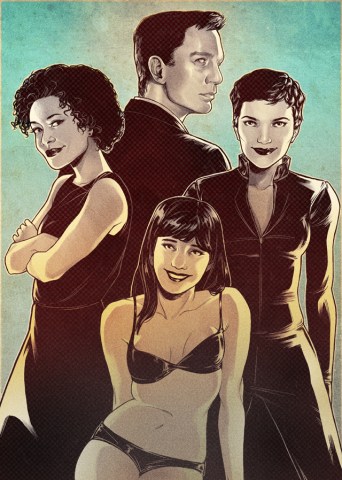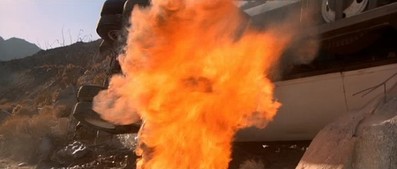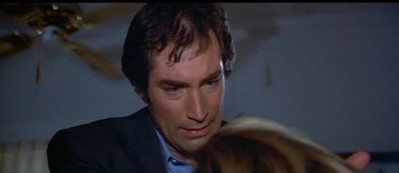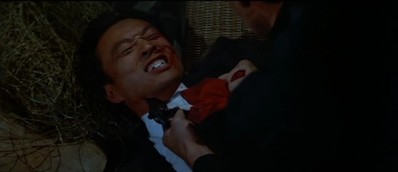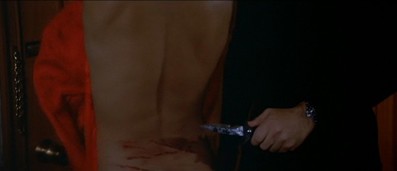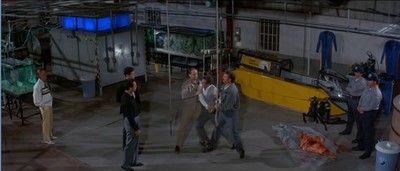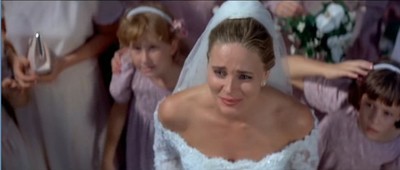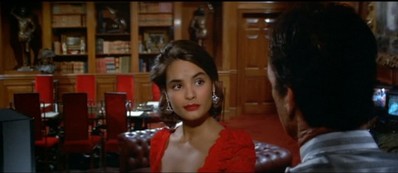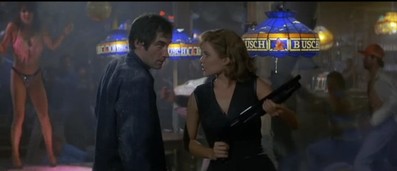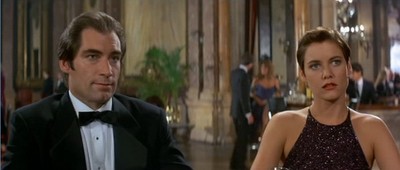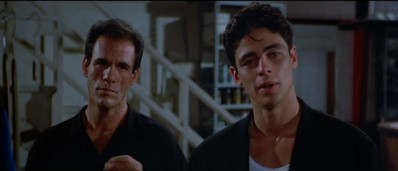Bond Girl: Re-Watching and Re-Evaluating Licence to Kill
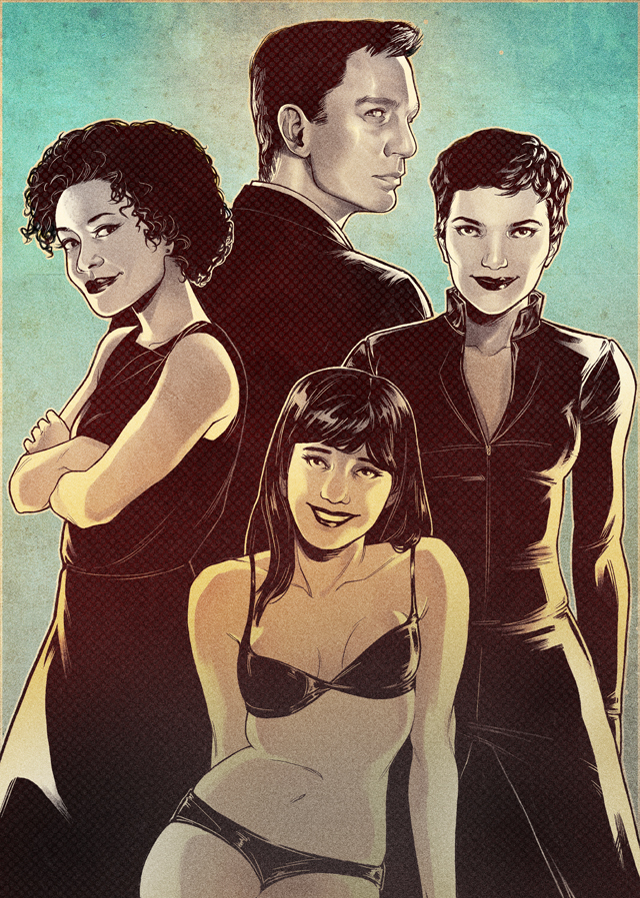
Original illustration by Emilie Majarian for The Mary Sue.
Welcome to Bond Girl, a new series where we’ll be re-watching and re-evaluating every James Bond film until Spectre’s release. Check out previous entries here.
Content warnings for discussions about rape, abuse, images of violence against women, and fridging.
There are many things that I don’t like about Licence to Kill.
Licence To Kill is the sixteenth James Bond film from Eon Productions. It’s also Timothy Dalton’s second and final outing as Bond. The plot of the film has small elements pulled from two of Ian Fleming’s short stories but otherwise, it’s an original story. In Licence To Kill, James Bond embarks upon an unsanctioned quest for revenge against drug lord Franz Sanchez after he has Felix Leiter, Bond’s close friend and ally, mauled by a shark and orders his new wife Della to be brutalized and then killed by his henchmen.
Licence To Kill is one of the darkest of the Bond films. Previously in the franchise, the darkness was kind of in sections and tempered by lighter moments. This movie is definitely light on those moments. Honestly, when I think of Licence To Kill, I think of those exploitative revenge films from the 70s. I’m talking about I Spit On Your Grave or the original The Last House On the Left in terms of that scary and yet satisfying thirst for revenge that is eventually quenched.
Seriously, it follows the formula pretty closely.
- Unthinkable violence occurs (in this case the assault on the Leiters)
- Friend/family member/Survivor vows to get revenge
- People in power refuse to help or can’t help
- Person in point #2 does everything they can to get revenge at the risk of their own physical/mental/emotional well being
- When they finally get revenge it’s both satisfying and a little ironic
Licence To Kill is highly representative of what is colloquially called the “rape and revenge” genre of film in some aspects. It’s a James Bond film so it’s still a spy film but the focus isn’t on espionage and doing the dirty work for queen and country. It’s largely on how even Bond’s status as a world-class spy isn’t enough to save the people that he loves and his official position makes avenging them even harder.
Looking at the film from that perspective, I actually thought it gave the film more depth. I mean, the very things that make it deep as a film are elements that I generally loathe in my media so I’m walking a fine line between mild appreciation and total dislike.
Technically, this isn’t even a bad movie.
At the box office, Licence To Kill made almost five times as much as its budget. It’s got a tight plot, gorgeous scenery, and characters that aren’t boring. Nevertheless, I still don’t like it. I don’t. I don’t think I can.
There’s just so much that’s wrong about the plot.
Let’s start by talking briefly about the film’s issues with race:
First of all, out of the many characters of color that appear in this film, only a few of them have speaking roles and only maybe two or three of them are recurring characters. That’s strike one. Your movie is largely set in the Caribbean and a major (albeit fictional) city in South America and yet most of your characters of color don’t even get to speak throughout the film?
Okay.
Sure.
Then we have the fact that most of the film’s characters of color don’t make it to the end. Grand L. Bush’s Hawkins and Talisa Soto’s Lupe Lamora are about it. Everyone else dies.
Sharkey, a friend of Bond who had a similar role and personality to Quarrel from Dr. No, dies after being discovered by Sanchez’s henchmen. Cary-Hiroyuki Tagawa and Diana Lee play Hong Kong Narcotics agents who die as well. Lee’s character Loti dives into the fray and is shot to death after Tagawa’s character Kwang advises her not to “let them take you alive”. Kwang commits suicide by cyanide pill moments later after Sanchez and his men reach him and attempt to interrogate him.
Here’s the thing about killing of characters of color: it’s not as if you can’t or shouldn’t do it. However, when you’re looking at a big franchise like this one where most of the films don’t have that many major characters of color, you’ve got to sit back and wonder why. Why are they being killed off? If there’s a quota for killing off characters, why these characters.
James Bond is a franchise where characters of all ethnicities and genders die. Bond is the only character guaranteed to make it to the end of the film and in some of the darker Bond offerings you question even that. And that’s something I’m actually okay with most of the time.
I have only the smallest of issues with character death. Really. It’s a minor pet peeve but it becomes magnified when watching the Bond films with only a few character of color and I wind up having to watch them die. I could literally talk about this all day because it’s another Hollywood thing that bugs me. Characters of color—even in nice, self-aware franchises—go through so much that it’s hard to be happy that there’s representation, that we’re represented.
I’m endlessly overprotective of characters that are marginalized in some way. It’s my main weakness with media. I go hard for minor marginalized characters. It’s sort of my thing…
This is why the next issue that I have with Licence To Kill? It’s about the film’s treatment of women.
Licence to Kill really isn’t kind to women and it starts from the very beginning.
Out of the two women that we see at the start (Felix Leiter’s wife Della and Franz Sanchez’s girlfriend Lupe Lamora), both are brutalized by men on screen within the first half twenty-five minutes. Lupe winds up badly beaten by Sanchez in the pre-credits scene and the camera zooms in to capture the fear and shame on her face in a way that is very jarring to witness. She’s beaten and badly so because she dared to sleep with someone that wasn’t Sanchez. Her lover’s heart is cut out. She is whipped, humiliated, and presumably scarred for life by Sanchez and you can tell that she’s normalizing his behavior towards her in the film. It’s so distressing.
Sadly, Della Leiter gets an even worse angle in the film.
After her husband and Bond go after Sanchez and arrest him in the pre-credits scene, she thinks that everything is going to be fine. However, Sanchez escapes thanks to an unscrupulous agent and part of his revenge plot comes at Della’s expense. Three of Sanchez’s henchmen rape and murder Della (both things are thankfully off-screen) with one of the henchmen, Dario, actually bragging about the crime later as Leiter struggles to get at them.
This scene in particular was very hard to watch. One of my biggest triggers, one of the things that I try very hard not to come into contact with in the media I consume, is sexual assault. Of course, in the Bond franchise, it’s super difficult to avoid it, but before Dalton’s run it largely tended towards the “rape as seduction” trope. I was dealing with it.
But between Licence To Kill and The Living Daylights, I’ve had about enough of the stuff.
Dalton’s run in the Bond franchise isn’t just dark because of the violence and the single-minded way that he goes after Sanchez. No. It’s dark because in a half an hour, two women are brutalized. We see Lupe’s assault by Sanchez onscreen, but Della’s assault and murder is off-screen. It’s a small mercy but one that I am incredibly thankful for.
Della is only in the film and alive for a half-hour and yet her death hit me hard. It’s not just that it’s a pivotal scene in the film and the driving force behind Bond’s quest for revenge. It’s not just that she was a genuinely adorable character or that I still root for her and Felix Leiter to have their happy ending even though I know better. It’s that she goes through all of that trauma and in the end, it’s used as a motivator for our main character.
Fridging is never going to be something that I’m okay with in my media.
It might actually be my biggest issue in the Bond series, how women are frequently killed or hurt so that Bond can get his butt in gear and leap into action. One recurring comment I have seen for this film is about how James Bond was so angered by Della’s death in particular because of the death of his wife Teresa. As much as I love that canon could support this theory and that we get On Her Majesty’s Secret Service acknowledged, I’m not that pleased.
It wasn’t enough that Leiter is one of Bond’s closest friends and allies and that a shark mauled him. No. His wife had to be assaulted and killed on top of that. Like why was that even a thing? It was unnecessary, overkill to a fault. Why couldn’t Leiter been killed and Della survived to the end of the film to have Bond thank her for the lighter that he used to kill Sanchez?
I wonder if it has anything to do with how the only thing that consistently works to motivate male action heroes is the death of a woman…
What sucks about Licence To Kill is that when it comes right down to it, the female characters are actually interesting. They were the best part of the film, but I just hated ninety percent of their treatment by Bond and other men in the film.
From the second that Della Leiter shows up on screen, you like her. She’s a likeable character, it’s her thing. She’s an obvious bright spot in Felix’s life and he wants to be with her forever. She has an easy and warm relationship with Bond that doesn’t feel weird even though there’s a definite undercurrent of sexual tension between them.
Even with dialogue that seems vaguely wonky, I still really liked her as a character. Seriously, she has this ridiculous scene with Bond that’s fraught with sexual tension and it’s on the day of her wedding.
Della Leiter: [kissing Bond] That’s a custom, you see. The bride always gets to kiss her best man.
James Bond: I thought it was the other way around.
Della Leiter: Aww… [kisses him again] Oh, James, would you mind? Felix is still in the study and we’ve got to cut this cake.
James Bond: I’ll do anything for a woman with a knife.
It’s such a great scene because the two of them are obviously close. Yeah, it’s a bit weird that she’s all but hitting on her best man but I thought that all of her interactions with Bond and with Felix were very nice. She’s this innocent in the spy genre in the way that Teresa Bond was. I suppose that’s why her death is so shocking no matter how many times I watch this movie.
She’s not supposed to be hurt. She’s not supposed to die.
And yet, that’s what happens.
Now, Lupe Lamora may not be the film’s main Bond Girl, but I’m mostly okay with that. Despite the difficulties I had with what happened to her in the film (from Sanchez’s everything to Bond’s casual dismissal and what feels like judgement of her choices on his end), I loved her as a character.
Why?
Because she’s unapologetic.
One thing about Lupe is that it’s pretty darn explicit that she doesn’t actually like Sanchez. She likes that he gave her a different life and money, but she doesn’t actually care for him. While she does normalize and excuse his treatment in the film (with lines like “It was my fault. I did something wrong, made him angry”), he’s the only person who she lets get away with any mistreatment.
When Sanchez’s henchman Krest comes on to Lupe in her cabin on board the Wavekrest, she puts him off. He’s slimy and creepy and he acts as if he’s next in line for Lupe’s attentions. Krest blames her for the DEA’s increased attention (as if killing the wife of a CIA agent and maiming the man in the process wouldn’t be enough to earn anyone additional attention from the government) and implies that she’s just one in a crowd of women that Sanchez has bedded and discarded.
Despite the fact that Krest’s threats and his body language proves to be aggressive in a way that borders on the sexual, Lupe doesn’t react the way he wants. She doesn’t get scared or anything like that. Nope. She insults Krest and tells him not only to get out of her room, but also to stop peeping in her windows while he’s at it.
Lupe also resists typical “damsel in distress” scenarios. Sure, she’s in a bad place and she’s with Sanchez who treats her horribly, but when Bond offers to send her home, Lupe wants none of it. During one of the scenes in the fictional tropical country of Isthmus, Lupe starts worrying about her future and the chances of her surviving. After asking Bond what she’s supposed to do, we get this bit of dialogue that sheds a bit of light on her murky backstory:
James Bond: Don’t worry. When this is all over, I’ll make sure you get back home.
Lupe Lamora: Home? It took me years to get away from there! I don’t wanna go back.
Coupled with several tidbits gleaned throughout the movie (Krest’s comments about a rigged beauty contest that Lupe “won” and Lupe’s prior job as a dealer at the big casino in Isthmus), I realized that Lupe must have been trying to escape something in her past. She’s trying to get further and further in her life and right now, the main way she can do it is to have the most powerful man in the room on her side.
What reinforces my thoughts on this theory is how at the end of the film, Lupe doesn’t end up with Bond. Sure, they have sex and she says that she’s in love with him, but they’re not destined to be together in the film. He turns her down flat for the main Bond Girl and you know what? She’s fine with that because as Bond points out during their final scene together, she and Hector Lopez, the president of Isthmus in the film, will be very happy together.
How much higher can you get than the wife of a president?
Even if the man isn’t that good at being president, it’s still a far sight better than being Sanchez’s mistress. She doesn’t get her happy ending with Bond, but she still get a happy ending and that’s pretty awesome. It’s very different from Lupe’s original characterization because according to the fantastic book Bond Girls Are Forever, Lupe was going to be an outright villain with no hope for redemption.
I can’t tell you how happy I am that they chose to do rewrites for her character.
Lastly in the ladies portion of this review is Pam Bouvier (played by Carey Lowell). She’s our official Bond girl for this film and the character that gets to swim off into the sunset with our main man. She’s also a really fantastic character and a total badass.
Pam is the kind of action hero that I want more than anything. She’s not a Strong Female Character TM but she’s also not a character that gets swept away by her desire for Bond and immediately requires all of the rescuing. (Also, there’s nothing wrong with needing to be rescued, but you’ve got to be suspicious with how many Bond Girls were written as competent spies and fighters right up until the moment that they meet him.)
Pam is ex-CIA and one of the informants responsible for helping Leiter and his team get the drop on Sanchez. She’s my favorite character in this film, hands down.
Sure, that’s not a hard designation to assign when you consider how most of the characters we see in this film are bad guys and that they really rank low on any favorites list that I could think up outside of “favorite death scenes”. Pam is a fabulous character because she’s bold and take charge and for the most part, she holds her ground against James Bond. Even when he’s doing his best to be a major pain, she’s there and she’s awesome.
I don’t think that any of the female characters in this film really lack agency but I do think that if we’re assigning quantitative values to agency and which characters have more of it, that Pam kind of comes out in front. She’s skilled in her field (both in espionage and in her work as a courier pilot), an excellent shot, and witty as hell. Where Lupe and Della were definitely overshadowed at points by the men around them and their stories kind of took second string to men, Pam stole the show for me.
She had so many good scenes that it’s truly difficult to sit down and go “oh this is the one” for any of them. At the least, I can narrow it down to two.
Her first big scene with James Bond in the bar on the dock was great. I loved how Pam had most (if not all) of the power in that scene and she put Benicio del Toro’s Dario to shame. How many times in this films do we get female characters who are able to put outright fear into the hearts of men? Pam does this easily and all with only a shotgun keeping her safe.
Pam also kills one of my least favorite characters, Sanchez’s sadistic rapist henchman Dario. Near the end of the film, when Dario has Bond cornered and hanging over the machine used to grind up the bricks of heroin for Sanchez’s scheme, Pam rushes in and saves the day.
Dario: [sees Pam as he’s about to kill Bond] Ha ha ha, you’re dead!
Pam Bouvier: You took the words right out of my mouth! [shoots him]
With a little help from Bond, Dario falls into the grinder. What follows is one of the most gruesome deaths that I’ve seen so far in the series. It’s also one of the more satisfying deaths because of how awful Dario was and how he’s set up to have no redeeming qualities. He’s straight up evil and you wind up rooting for Pam not only because she saves James Bond, but because she’s instrumental in taking out one of the worst characters in the film.
Now I’ve got one last bone to pick with Licence To Kill and it’s squarely centered on the villains in the film. Our big bad is Franz Sanchez (played by Robert Davi) and he comes with two main henchmen: rapist Dario (Benicio del Toro) and Milton Krest (Anthony Zerve).
I suppose that they’re good villains because they’re unrepentantly evil and capable of doing the absolute worst. There’s no doubt that the three of these men are sadists and that they take pleasure in the suffering of others. We’ve had worse villains before in the franchise and worst villains after this film so technically, they’re nothing special.
We’ve had villains who were abusive to their mistresses, villains that were rapists, and villains that thought their power meant that they were god’s gift to women. These guys in this film literally aren’t anything new to me. They’re not going to live forever on any of the best Bond Villain lists I’ve seen floating around because they’re incredibly common. They’re regular villains, not Bond villains.
Where’s the scheming?
Where’s the weird thing that makes them memorable?
Like Live And Let Die, Licence To Kill was touted as a Bond film with an emphasis on realism. But here’s the thing: at least Live And Let Die had something novel in the form of supernatural elements that may/may not have been the real deal.
There’s no twist to this film and the villains aren’t even remotely interesting. They’re just terrible. They’re the people who populate news reports and threaten our neighborhoods and while they’re certainly real, who actually watches James Bond films for the realism?
I think that even though this film was a huge commercial success, that it just fell short in many ways for me. It’s not a bad movie in terms of plot and writing, but when it comes to portrayals of women, I find myself frowning intensely because that overshadows everything for me. Licence To Kill is a movie that had a major plot point stem from the sexual assault and murder of a young woman.
Even if I wanted to, I don’t think that I could make myself enjoy it.
What I’m looking forward to:
GOLDENEYE!
I’ve already gushed about everything I could as far as that movie’s concerned, but seriously—this is my favorite movie. I think I’ve been looking forward to GoldenEye from the second that I started writing this series. It’s been hard for me to try and pick which Bond actor is my favorite but I’m going to be upfront: it’s a tie between Pierce Brosnan and Daniel Craig and GoldenEye is like eighty percent of the reason why I feel that way.
Stitch writes about comics, nerd history, and ridiculous romance novels when not working frantically on her first collection of short stories. Find her on her blog or on Twitter.
—Please make note of The Mary Sue’s general comment policy.—
Do you follow The Mary Sue on Twitter, Facebook, Tumblr, Pinterest, & Google +?
Have a tip we should know? [email protected]
